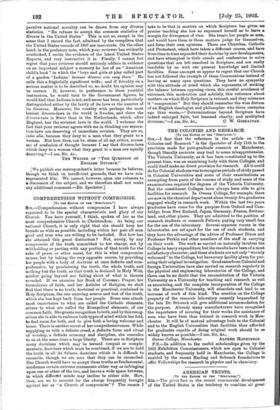COMPREHENSION WITHOUT COMPROMISE.
[To THE EDITOR OF THE "SPECTATOR."] SIR,—Comprehension without compromise I have always supposed to be the special characteristic and glory of our Church. You have yourself, I think, spoken of her as the most comprehensive Church in Christendom. As being our national Church, it is only right that she should keep her bounds as wide as possible, including within her pale all men good and true who are willing to be included. But how has she attained this great distinction ? Not, surely, by any compromise of the truth committed to her charge, not by withholding or parting with any portion of that truth for the sake of peace or other cause, for this is what compromise means, but by taking the very opposite course, by providing her people with a body of doctrine at once definite and com- prehensive, by proclaiming the truth, the whole truth, and nothing but the truth, as that truth is declared in Holy Writ, neither going beyond nor falling short of what is therein revealed. If we examine her Book of Common Prayer, her formularies of faith, and her Articles of Religion, we shall find that there is no truth, doctrinal or practical, contained in Holy Scripture, the one unerring source and test of the truth, which she has kept back from her people. Some men attach most importance to what are called the Catholic elements, others to what are called the Evangelical elements, of our common faith. She grants recognition to both, and by this recog- nition she is able to embrace both types of mind within her fold, to find room for both, and to give both a loving welcome and home. There is another secret of her comprehensiveness. While supplying us with a definite creed, a definite form and ritual of worship, a definite economy and discipline, she concedes to us at the same time a large liberty. There are in Scripture many doctrines which may be termed coequal or comple- mentary, doctrines which must be combined, if we are to hold the truth in all its fulness, doctrines which it is difficult to reconcile, though we are sure that they can be reconciled- Our Church would have us accept these truths as fundamental, condemns certain extreme statements either way as infringing upon one or other of the two, and leaves a wide space between, in which different minds may incline to either side. How, then, are we to account for the charge frequently brought against her as " a Church of compromise" ? The reason I
take to be that in matter& on which Scripture has given-no precise teaching she has so expressed herself as to leave a margin for divergence of view. She treats her people as men, and would have them in these matters judge for themselves, and form their own opinions. There are Churches, Catholic and Protestant, which have taken a different course, and have from time to time expanded their doctrine by new developments, and have attempted in their creeds and confessions to solve questions that are left unsolved in Scripture, and are really insoluble by us with our present knowledge and limited faculties. Some amongst us appear to regret that our Church has not followed the example of these Communions instead of leaving so many open questions. They have no sympathy with this attitude of mind which she represents, of • striking the balance between opposing views, this careful avoidance of extremes, this moderation and sobriety, this reticence about matters on which Holy Scripture is reticent, and they misname it " compromise." But they should remember the wise dictum of an English theologian and philosopher who three centuries ago thus wrote,—" Determinations beyond Scripture have indeed enlarged faith, but lessened charity, and multiplied






































 Previous page
Previous page